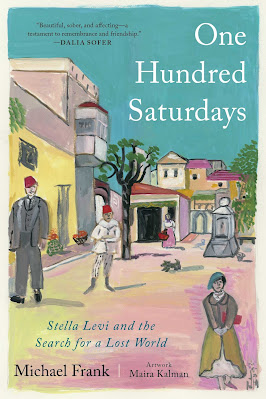Michael Frank met Stella Levi at a lecture. Stella connected with something inside Michael and asked him to correct a speech she was set to give. This started their Saturday meetings. Over the course of 100 Saturdays, Stella and Michael met in her New York City apartment where she shared her life story. In her 90s she shares stories that she has rarely shared with anyone. But it's not just her stories that she shares. She also shares commentary on her life history. Michael records these stories and insights while also sharing some of his own research on some of the history she touches on. Stella is one of few Jews who survived the deportation of 1600+ Jews from Rhodes during World War II.
Amazon affiliate links are used on this site. A free book was provided for an honest review.
When I attended Simon & Schuster's fall preview, One Hundred Saturdays was the book I was most excited about. I've read WWII fiction for years and years and I've recently started to venture into WWII nonfiction. Stella is a Jew from what was then Italian-controlled Rhodes in the Greek islands.
I've only started to read stories set in Italy during WWII so not only does One Hundred Saturdays provide a first hand account it also gave me information about a part of WWII that I don't know much about.
I keep saying this is WWII nonfiction, but truly it is so much more. Stella begins at the beginning - the beginning of her life. She was the youngest child in her family and she shares stories from her childhood. She also explains Jewish traditions and customs that I did not know about. Also, Rhodes is a true melting pot so there was a lot of cultural mixing.
The Jews who lived in the Juderia were originally Spanish exiles. Rhodes had once been part of the Ottoman Empire and Turkish influences are prominent. During Italy's imperialism, they took control of Rhodes. This was fascist Italy led by Mussolini. They modernize the island.
I liked that we got the "before" picture of the Jewish community. In my WWII fiction reading, I rarely get the before - before the racial laws, before the hatred become normalized, before the war.
As with anyone who has lived nearly a century, Stella has many stories. But she lived through a piece of history that few understand - including those that lived it. Stella makes a statement after attending a lecture on the war years in Italy. She something to the effect that what the lecture presented was what happened but also not what happened. She was saying that looking at the historical record can only tell you so much about the time, that experiencing it in many ways felt different than history makes it seem. Through the stories she shares of friends, family, and life in the Juderia the reader gets a dim picture of what it was like to live through this historical moment.
I know that giving names and faces to even a small community that was basically wiped out gave me a new understanding of the time period. I knew it was awful but I have always been removed from it. In one of the final chapters, Micheal writes about an exhibit that was set up in New York City to commemorate the Juderia. One of the nights, Stella speaks and afterward people line up to talk to her. When it is one woman's turn she asks if Stella knew her mother. Stella did and shares her memories of this woman. At another time she is reminiscing with others that lived there and they mention three people. At the end, the reader is reminded that these three very real people were sent to the ovens at Auschwitz. Both of these accounts were profound moments for me and I shed a few tears.
One Hundred Saturdays puts a human face on what most of us only know as facts in a history book. I think the way Frank presents Stella's story makes it more personal than a biography or even a memoir. I was reading the words, but I could very well have been sitting in the room listening to her talk.
Stella speaks a number of languages and there are phrases, poetry, and song lyrics in other languages - mostly Italian and Judeo-Spanish but some Turkish and French. These words are not often translated. If the foreign words are customs or a feeling then there is usually an attempt at an explanation. It didn't bother me and it makes up a very small portion of the book.
This is the first book where I got a first-hand account of a Holocaust survivor where we get the story of life before, during, and after WWII. It perhaps raises more questions about this time in history than it answers. As Stella admits she lived through it and still doesn't understand it - still has unanswered questions. But it did give me a new perspective, new information that changes and adds to my own reflections on this historical period.
Buy One Hundred Saturdays at Amazon
Donna Huber is an avid reader and natural encourager. She is the founder of Girl Who Reads and the author of how-to marketing book Secrets to a Successful Blog Tour.
Enjoyed this post? Never miss out on future posts by following us. Get even more book news in your inbox, sign up for our newsletter today! Girl Who Reads is an Amazon advertising affiliate; a small commission is earned when purchases are made at Amazon using any Amazon links on this site. Thank you for supporting Girl Who Reads.




















0 comments:
Post a Comment